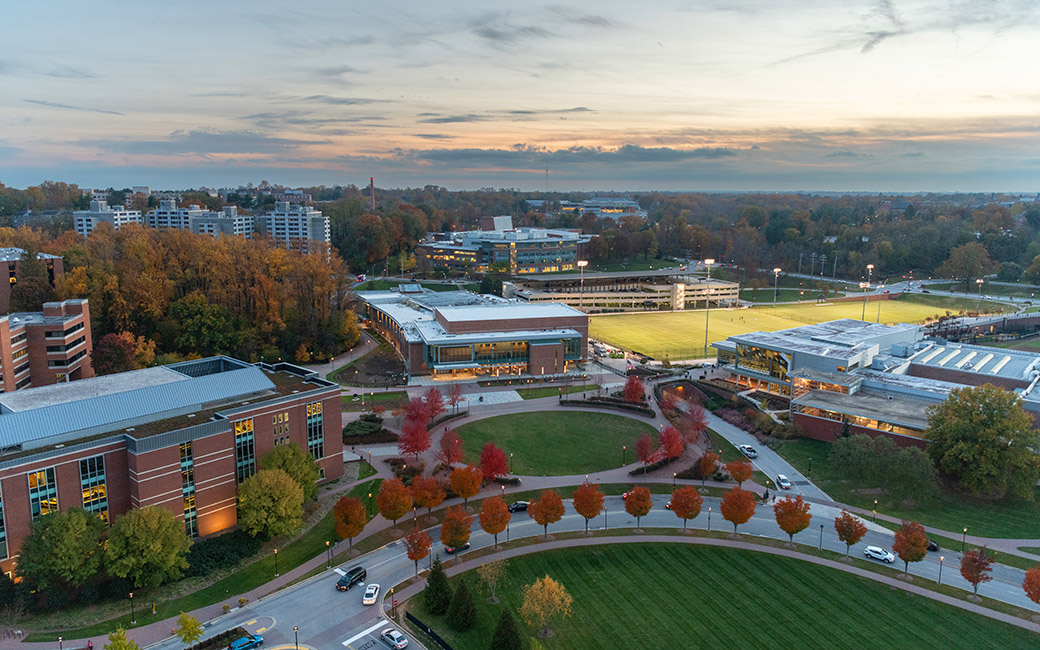TU Foundation announces 2022 grant award recipients
Nearly $100,000 in grants awarded to Towson University projects
February 1, 2022

For the fourth consecutive year, the Towson University Foundation (TUF) has awarded nearly $100,000 in grants to Towson University projects. The 2022 grant recipients include projects focusing on secure elections, mental health awareness, curriculum preparation for Living Learning Communities and urban history/cultural teaching in today’s classroom.
“The work being performed every day by our students, faculty and staff advances our mission to provide national leadership for the public good,” TU President Kim Schatzel said. “TU is providing insights and answers to many of the critical questions facing our nation and society. This would not be possible without the tremendous generosity of our donors and their unwavering support of our mission to serve as an anchor institution for greater Baltimore and our state."
The TUF was established in 1970 as a nonprofit 501(c)3 corporation, enabling donors to make tax-deductible contributions to TU scholarships and fellowships, faculty development, research, outreach projects and academic and other programs.
"We are very pleased with the number and quality of grant applications submitted this year,” says J. William Murray, TUF president. “This year’s pool of applicants and the subject areas represented are very exciting. We are happy to fund four very worthy programs.”
The foundation received 22 applications for more than $500,000 in funding from faculty and staff representing each academic college and the Office of Inclusion & Institutional Equity (OIIE); the divisions of student affairs, finance and administration, Strategic Partnerships & Applied Research and athletics. The following projects will benefit from TUF Grant awards made in December 2021.
Empowering Secure Elections ($24,584)
This project will research, develop and validate online training modules to educate more than 30,000 poll workers on the threats to mail-based voting processes and enable them to identify and mitigate these threats. The project will also continue to build stronger awareness of potential election threats and what is being done to protect the integrity of votes. Students will play a key role in research, experiential learning opportunities and writing and presenting research results at academic conferences and in journals. To date, 17 students have contributed to previous research efforts and 10 have co-authored work.
“This grant support will provide students with authentic research experiences that directly contribute to the betterment of our local, state and national election processes. We thank the TU Foundation and the university for recognizing the importance of this work.”
-- Josh Dehlinger, professor, Department of Computer & Information Sciences
Healthy Minds, Healthy Tigers ($24,950)
Implementing a campus-wide action plan to train employees and students in mental health first aid (MHFA) will empower the community to recognize and assist students in distress. The Healthy Tigers project is twofold: to educate the campus community on mental health awareness and response through MHFA training and to remove mental health stigmas and treatment barriers by providing trauma-sensitive programs for students at the Campus Recreation Center. The program anticipates training 125 people in MHFA and four as MHFA instructors to expand the program. Within Campus Recreation, six professionals will train in trauma-sensitive yoga and four in trauma-informed weightlifting to benefit more than 100 participants in the first year.
“We are addressing the mental health needs of our students through education and awareness-building that equips faculty, staff and students to care for their mental health and increase their ability to graduate and serve as effective, ethical leaders and engaged citizens. The grant will help build a foundation of support for all TU students now and in the future.”
--Grady Sheffield, director of Campus Recreation
Housing & Residence Life Learning Community ($25,000)
Under the lead of Director of Residence Life Malinda Jensen, a residential curriculum and process of onboarding new Living Learning Communities will be developed and implemented. This Office of Housing & Residence Life and Division of Academic Affairs partnership will increase student exposure to faculty and academic peers, thus improving academic performance, engagement and enrollment retention rates. The first-year program beneficiaries will be 135 resident students. Lessons learned will be applied to future operations with an ultimate goal of 30–50% of first-year residential students actively engaging in learning communities.
“The energy between Academic Affairs and Student Affairs is palpable as we commit our resources to offering more high-impact, co-curricular living learning experiences for our residential students.”
--Malinda Jensen, director of housing & residence life
Voices and Places of Baltimore: Exploring Life Under Segregation and Community Contributions Through an Education-based Immersion Study ($25,000)
Understanding the impact of urban history as a matter of teaching cultural awareness is critical to learning at the K–12 and postsecondary levels. This grant project brings together K–12 educators from Baltimore City and Baltimore County and TU faculty (teaching sections of EDUC 202) and their students for a series of remote and in-person experiences facilitated by the Nobis Project. Participants will attend in-person, immersive field trips; visit Black heritage sites and participate in community experiences. Remote workshops, provided in partnership with Nobis and the Voices of Baltimore film project, will also be included for selected sections of EDUC 202. The purpose is to prepare seasoned K–12 teachers and TU faculty and students to teach issues of social justice, inclusion and equity; how to examine systems of inequity and dismantle a single narrative.
"We are excited to connect TU faculty and students with local K–12 educators. Increasing our awareness of the cultural richness of historic Black communities and businesses in Baltimore will transform our own classroom practices."
Morna McNulty, professor, Department of Elementary Education